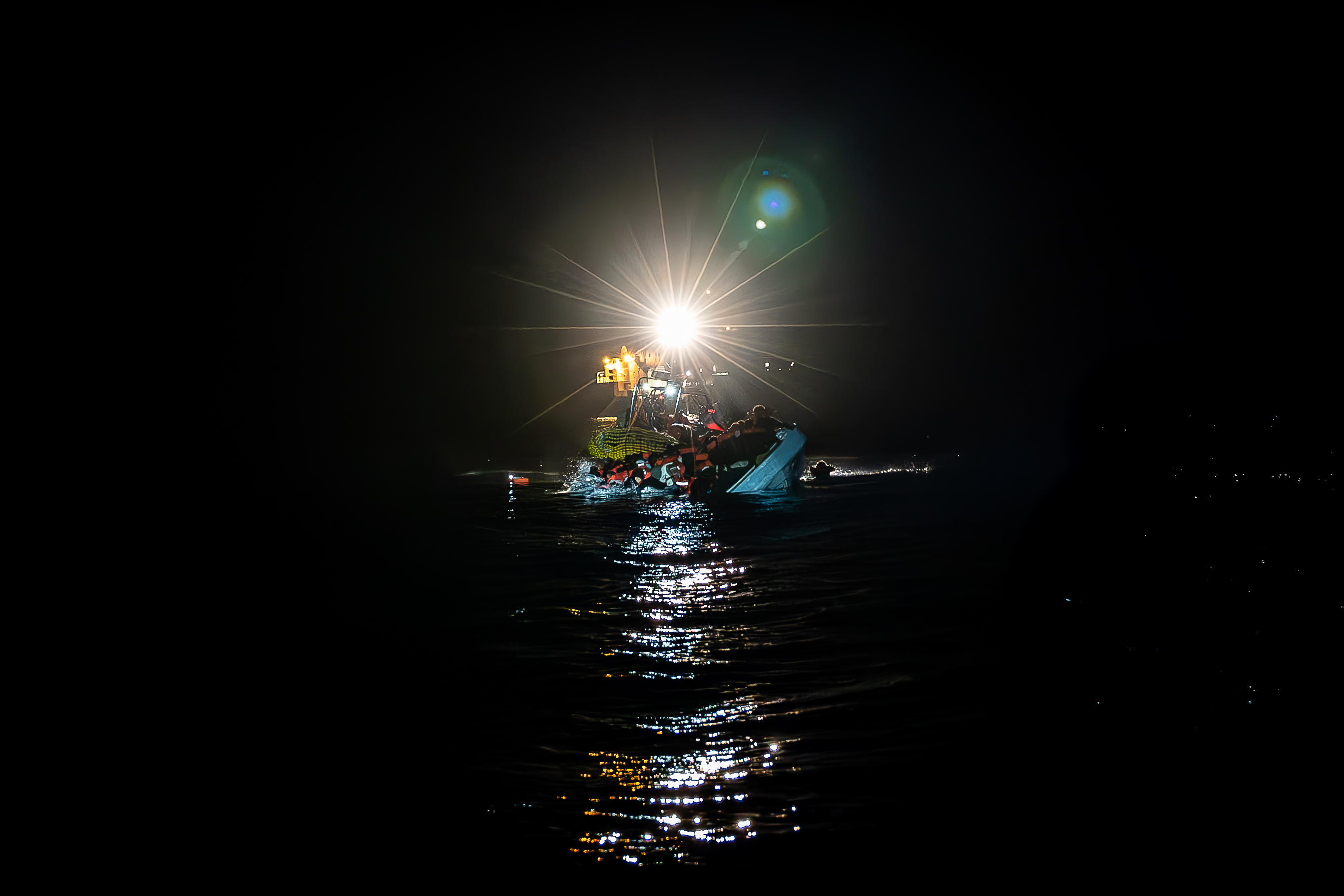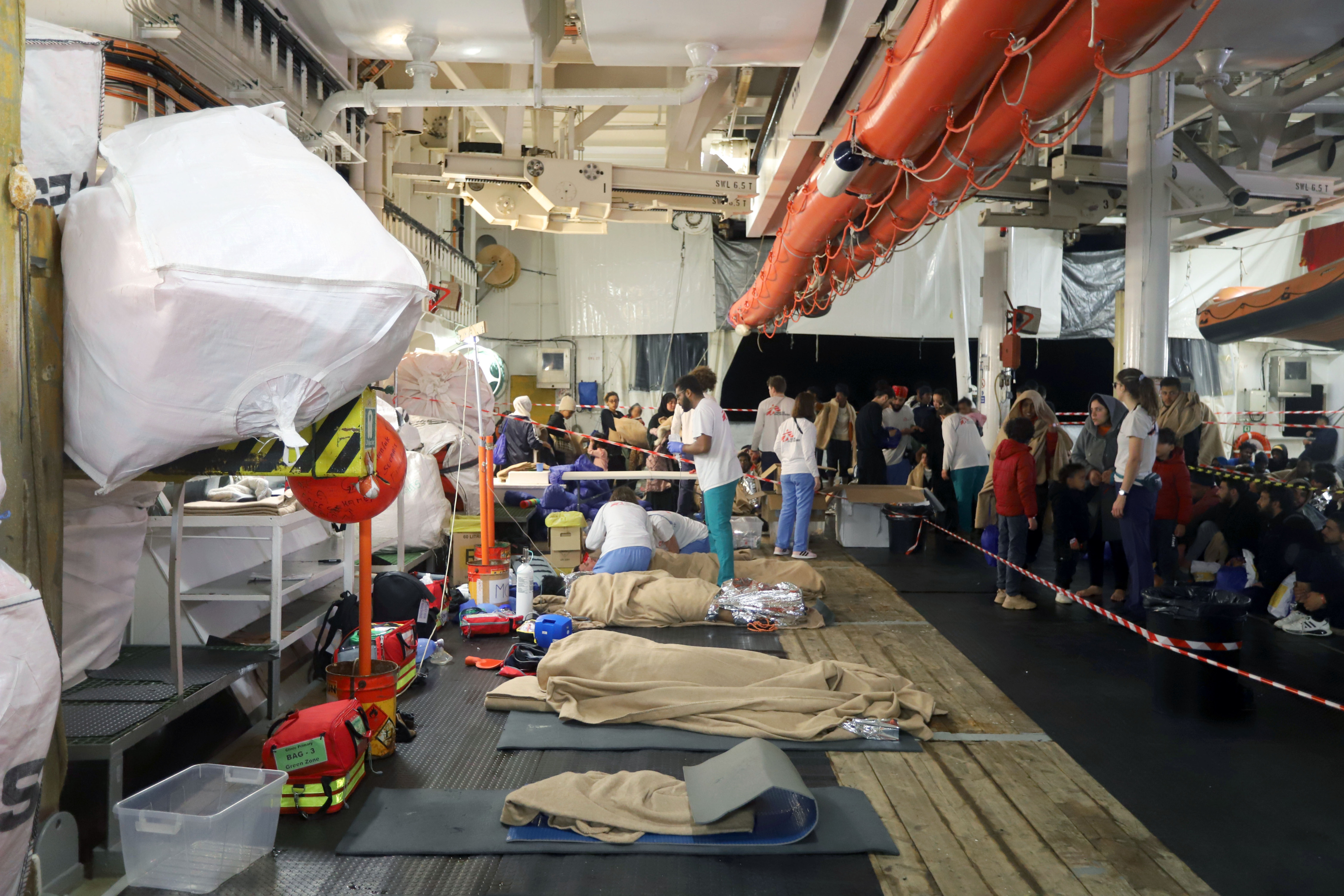A Man of Courage
Idriss, 40 years old, Morocco
Idriss, 40 years old, Morocco
16 March 2024, around 10pm. Somewhere in the Central Mediterranean Sea.
The screams and calls for help were terrifying when a boat full of people capsized before our eyes that night: chaos, hysteria, and the sound of people fighting for their life.
MSF teams onto two fast rescue boats—rigid hulled inflatable boats (RHIBS) — were extremely focused and bursting with adrenaline, desperate to reach and recover everyone who had been thrown into the cold, dark waters of the Mediterranean Sea.
Idriss was one of them.

"There [was] this young man, a friend, who [told me he] wants to pay for his daughter’s wedding. But he doesn't know how to swim. Then I [saw] all these children.... These were the moments when I felt extreme emotions. There was a lot of fear in that boat," said Idriss, a 40-year-old construction worker from Morocco, remembering the moments before the overcrowded boat capsized.
After Idriss was rescued from the water with about a dozen other people, I saw him sitting on the edge of the RHIB helping us to recover more survivors—grabbing and pulling them up onto the boat, trying to reassure everyone that they are in good hands now and that we will not let them go.
Suddenly, Idriss jumped overboard.
I was astonished. In the middle of the night and the screams, Idriss was swimming in his clothes in the cold sea without a life jacket. He looked like a small grey-blue dot making its way somewhere—or to someone.
"I felt that I had some energy and courage left." Idriss
"When I was on the MSF rescue boat, I felt that I had some energy and courage left,” said Idriss. "I heard my name—it was my friend, the one who wants to organize his daughter’s wedding – calling me. He couldn’t swim. I wanted to help him."
Idriss swam back to the RHIB, but not alone. He was pulling his friend with him. He then helped his friend get onto the boat—which is much more difficult than it sounds. A person weighs much more in water because of the wet clothes. Still, Idriss pushed his friend up, and then managed to climb into the RHIB himself.
After making sure his friend was safe, he continued to help us.
From the RHIB, we could see a young woman calling for help from the dark waters. I will never forget her desperate shouts, her face, and her wide eyes.
Her baby was one of the 25 women and children who were rescued from the boat before it capsized. I could only imagine this mother's distress while she was fighting for her life and maybe thinking about how her baby might spend the rest of her life without a mother. Although she was alone in the water, I had the feeling this mother was fighting for two lives.
Until, finally, Idriss’s strong hand pulled her out of the water into safety.

“I was only fulfilling my duty.” Idriss
“I was only fulfilling my duty,” said Idriss when asked about his courageous actions that night.
After several stressful hours, MSF teams managed to find and recover all the people who had fallen into the water. The young mother and her baby were reunited on board Geo Barents soon after.
Many of the 150 survivors who were already on board Geo Barents – from the two previous rescues conducted by MSF on that 16 March - assisted us to care for the people from the capsized boat. Some of them were suffering from hypothermia and severe shock, and were in serious condition.
The next morning, when the sun rose again over the sea, everyone was already feeling better, gradually recovering from the traumatic event of the night.
During that dark night in the Mediterranean Sea, solidarity and empathy were not only empty words.
Blog by Stefan Pejovic, Field Communications Manager on board Geo Barents.

Some of the rescued people were suffering from hypothermia and severe shock on board of Geo Barents on March 2024. Picture: MSF/Stefan Pejovic.
Background
On 16 March 2024, MSF teams on board the search and rescue vessel, Geo Barents, rescued 249 people from three boats in distress in the Central Mediterranean Sea. Following the first rescue of 28 people from a fiberglass boat, the MSF team started to rescue 146 people in distress from a wooden boat. During this rescue operation, the Libyan Coast Guard dangerously interfered and delayed the completion of the rescue for several hours. MSF was eventually able to rescue everyone from the wooden boat and welcome them on board Geo Barents
Later that night, MSF teams rescued 75 people from another fiberglass boat, including 45 people who were thrown into the water when the boat capsized. All 249 survivors, including many children, disembarked on 20 March in Marina Di Carrara, in the north of Italy.